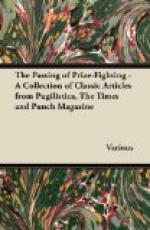But first a word of warning. There are perhaps
some who believe that a poem should not only express
high and noble thoughts, or recount great deeds, but
that it should do so in verse that is musical, cadenced,
rhythmical, instinct with grace, and reserved rather
than boisterous. If any such there be, let them
know at once that they are hopelessly old-fashioned.
The New Poetry in its
highest expression banishes
form, regularity and rhythm, and treats rhyme with
unexampled barbarity. Here and there, it is true,
rhymes get paired off quite happily in the conventional
manner, but directly afterwards you may come upon
a poor weak little rhyme who will cry in vain for his
mate through half a dozen interloping lines.
Indeed, cases have been known of rhymes that have
been left on a sort of desert island of a verse, and
have never been fetched away. And sometimes when
the lines have got chopped very short, the rhymes
have tumbled overboard altogether. That is really
what is meant by “impressionism” in poetry
carried to its highest excellence. There are,
of course, other forms of the New Poetry. There
is the “blustering, hob-nailed” variety
which clatters up and down with immense noise, elbows
you here, and kicks you there, and if it finds a pardonable
weakness strolling about in the middle of the street,
immediately knocks it down and tramples upon it.
Then too there is the “coarse, but manly”
kind which swears by the great god, Jingo, and keeps
a large stock of spread eagles always ready to swoop
and tear without the least provocation.
However, Mr. Punch may as well let his specimens
speak for themselves. Here, then, is
NO. I.—A GRAVESEND GREGORIAN.
BY W.E. H-NL-Y. (CON BRIO.)
Deep in a murky hole,
Cavernous, untransparent, fetid, dank,
The demiurgus of the servants’ hall,
The scuttle-bearing buttons, boon and
blank
And grimy loads his evening load of coals,
Filled with respect for the cook’s
and butler’s rank,
Lo, the round cook half fills the hot
retreat,
Her kitchen, where the odours of the meat,
The cabbage and sweets all merge as in
a pall,
The stale unsavoury remnants of the feast.
Here, with abounding confluences of onion,
Whose vastitudes of perfume tear the soul
In wish of the not unpotatoed stew,
They float and fade and flutter like morning
dew.
And all the copper pots and pans in line,
A burnished army of bright utensils, shine;
And the stern butler heedless of his bunion
Looks happy, and the tabby-cat of the
house
Forgets the elusive, but recurrent mouse
And purrs and dreams;
And in his corner the black-beetle seems
A plumed Black Prince arrayed in gleaming
mail;
Whereat the shrinking scullery-maid grows
pale,
And flies for succour to THOMAS of the
calves,
Who, doing nought by halves,




